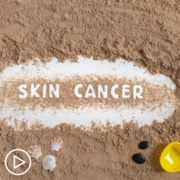Emerging Treatments for Advanced Non-Melanoma Skin Cancer: What’s Showing Promise? from Patient Empowerment Network on Vimeo.
Advances in research for non-melanoma skin cancers lead to new treatment options. Dr. Diwakar Davar provides an update on emerging therapies and shares advice for staying abreast of the latest news.
Dr. Diwakar Davar is the Clinical Director of the Melanoma and Skin Cancer Program at UPMC Hillman Cancer Center. Learn more about Dr. Davar.
Download Guide
See More from Evolve Non-Melanoma Skin Cancer
Related Resources
Transcript:
Katherine:
Dr. Davar, now that we understand approved approaches, can you walk us through ongoing research and developing treatments that patients should know about?
Dr. Davar:
Yeah. Now, if you think about it, the vast majority of patients with, say, cutaneous squamous cell carcinoma is presenting with large tumors involving the areas of the head and neck region. The average tumor size is approximately 1 to 2 cm.
There are small groups of patients with much larger tumors and/or tumors with high-risk features. These include tumors that are either anatomically large or 3 cm, 4 cm in size, tumors that involve critical locations, such as the bone, the skull table, the jaw, tumors that are very close proximity to critical structures such as the eye, or tumors involving lift nodes in the neck.
In these patients, recent work by many groups including ours has demonstrated that perioperative immunotherapy improves outcomes. What is perioperative immunotherapy? In the context of melanoma and lung cancer, giving people immunotherapy before surgery improves patient outcomes. This the same drug that you would normally get after surgery, but giving it before surgery. The very same drug before surgery improves event-free survival.
It improves the likelihood of cancer not coming back. The primary reason for that is by turning the immune system on even before you take the tumor out, you sensitize the immune system to tumor antigens, you kill more cancer, and you do that while the tumor is present because the immune system acts and recognizes this with the immune therapy acting as a vaccine. This approach has now migrated to non-melanoma skin cancer and is actually transformative, particularly given the location of these tumors which render surgery difficult.
Therefore, in this disease, not only is perioperative immunotherapy especially transformative in terms in terms of producing dramatic response rates, the median response rate of pathologic perioperative immunotherapy is approximately a path CR rate of approximately 50 percent. In pivotal trials done by Neil Gross, the results of which have been published in prominent journals, neoadjuvant or perioperative cemiplimab (Libtayo), anti-PD-1 inhibitor from Regeneron has shown path response rates of approximately 50 percent.
Whether it’s given for two cycles over six weeks or four cycles over three months, this drug really dramatically reduces the tumor and improves the likelihood of the cancer not coming back. More interestingly, recent data has also shown that this affects surgical outcomes in other ways. Historically, in melanoma and lung cancer and other diseases where perioperative immunotherapy is a standard of care, we never considered the nature of the surgery. Patients still underwent the same surgery that they would’ve undergone anyway whether or not they got immunotherapy.
However, given the dramatic effect of perioperative immunotherapy, increasingly, we are turning out attention, particularly in cutaneous squamous cell carcinoma, which involves critical structures, to the role of surgical de-escalation as well as radiation de-escalation.
We’re trying to see if by using perioperative immunotherapy, you can give people potentially less radical surgery, make people heal faster, undergo less plastic surgical reconstruction, improve functional outcomes, and also reduce the need for radiation, particularly in the patients who have done extraordinarily well to reduce the risk of radiation-related early and long-term toxicity.
These results, some of which are recently being presented at prominent national meetings by Dr. Zuur from the Dutch NKI as well as Dr. Ascierto from the Italian National Cancer Institute in Naples have shown that firstly, the pathological response rates are high but very provocatively, surgical de-escalation has been achieved and is associated with good quality of life. What we are seeing here is that perioperative immunotherapy really has an increasing role, particularly in this disease, for reasons that have to do with the unique anatomical location of perioperative cutaneous squamous carcinoma.
Perioperative immunotherapy is also migrating to other non-melanoma skin cancers including Merkel and basal cell carcinoma. Early trials have been done. The drugs appear to be effective. However, trials are still needed to further understand the role of perioperative immunotherapy in these other two entities. However, in cutaneous squamous cell carcinoma, perioperative trials are very advanced, pivotal trials are being designed, and increasingly, this is considered a standard of care for potentially resectable patients.
You and I have talked about the role of immunocompetent non-melanoma skin cancer but one thing that patients do not necessarily realize that if you have a solid organ transplant such as a liver transplant, a heart transplant, or a kidney transplant, the primary reason for mortality in the first one year is allograft failure. However, if you make it past three years, the primary reason for mortality is cancer, and not cancer of the lung, but primarily, skin cancer. In this instance, the reason that skin cancer is common now, on average, skin cancers in transplant patients are much more common than skin cancer in non-transplant patients.
In fact, patients with solid organ transplants had 100-fold higher risk of developing skin cancer compared to the general population. It has to do with the immunosuppression that is used. The immune suppression that maintains allograft tolerance also reduces T cell function.
That reduction in T cell function allows for immune escape and the development of high-risk skin cancers. The most important thing that transplant patients need to do is make sure that they see a dermatologist. Increasingly, as we discover high risk skin cancer, there have been two main approaches that have been identified that are potentially helpful. The first is investigators at two primary sites. One, Dr. Evan Lipson at the Johns Hopkins University and Dr. Glenn Hanna at Mass General Hospital have independently demonstrated, and very provocatively, that in organ transplant patients, very close titration of immunosuppression can be done to allow for the concomitant use of immune modulating therapy.
Historically, this is a patient population for whom systemic anti-PD-1 immunotherapy was technically contraindicated because the primary risk was allograft failure. What Dr. Hanna and Dr. Lipson have demonstrated is that by carefully modulating the doses of immune suppression, you can co-administer systemic anti PD-1 without allograft rejection, and these transformative results have been publicly represented by Dr. Hanna and Dr. Lipson as a paper under review in a prominent journal.
Concurrently, work by a biopharmaceutical company known as Replimune has demonstrated that the intralesional administration of an oncolytic virus, a cancer killing virus known as RP1, has provocatively demonstrated anti-cancer effect in high-risk, advanced transplant-associated skin cancers.
These data have been presented by many colleagues, including myself and others at several recent meetings, and the most recent publication of which was by Dr. Mike Migden of MD Anderson Cancer Center in a recent transplant meeting. This drug, which was injected within the tumor by direct visual injection has dramatic effect in up to about 25 percent of the treated patients without any risk of allograft rejection and/or herpes serial conversion because this is an attenuated herpes virus. These two advances have dramatically altered the potential for patients with solid organ cancers who are developing skin cancers to potentially get novel agents that would otherwise, the absence of which, potentially result in mortality.
Katherine:
Wow. That’s really exciting news. Research often moves quickly and I think you’re just pointing this out. How can patients stay up to date with what’s going on?
Dr. Davar:
Well, it’s very difficult. The information is moving at the speed of light in this disease. In fact, the first study of perioperative immunotherapy was done two years ago. Right now, perioperative immunotherapy is on NCCN guidelines.
It’s not FDA-approved, but it’s a strong Class One recommendation on NCCN given the dramatic data that Dr. Gross and many of our colleagues have generated. Just in the span of three years, much has been achieved. The way to stay up to date is to read and also to seek out information from well-trusted sources. Information such as what has been generated by the Health Content Collective, information that is from WebMD and these other areas are very useful, but do check in with your providers. Please make sure your providers are up to date and do not be afraid of asking questions. No provider would ever feel insulted that you are questioning his or her judgment by asking a question.
I often welcome patients to ask me questions about whether or not I feel like this is the best therapeutic modality, and do ask if there is a role for novel treatments. This is particularly because when you advance, as I mentioned, at the speed of light, particularly in the context of patients who are immunosuppressed…












